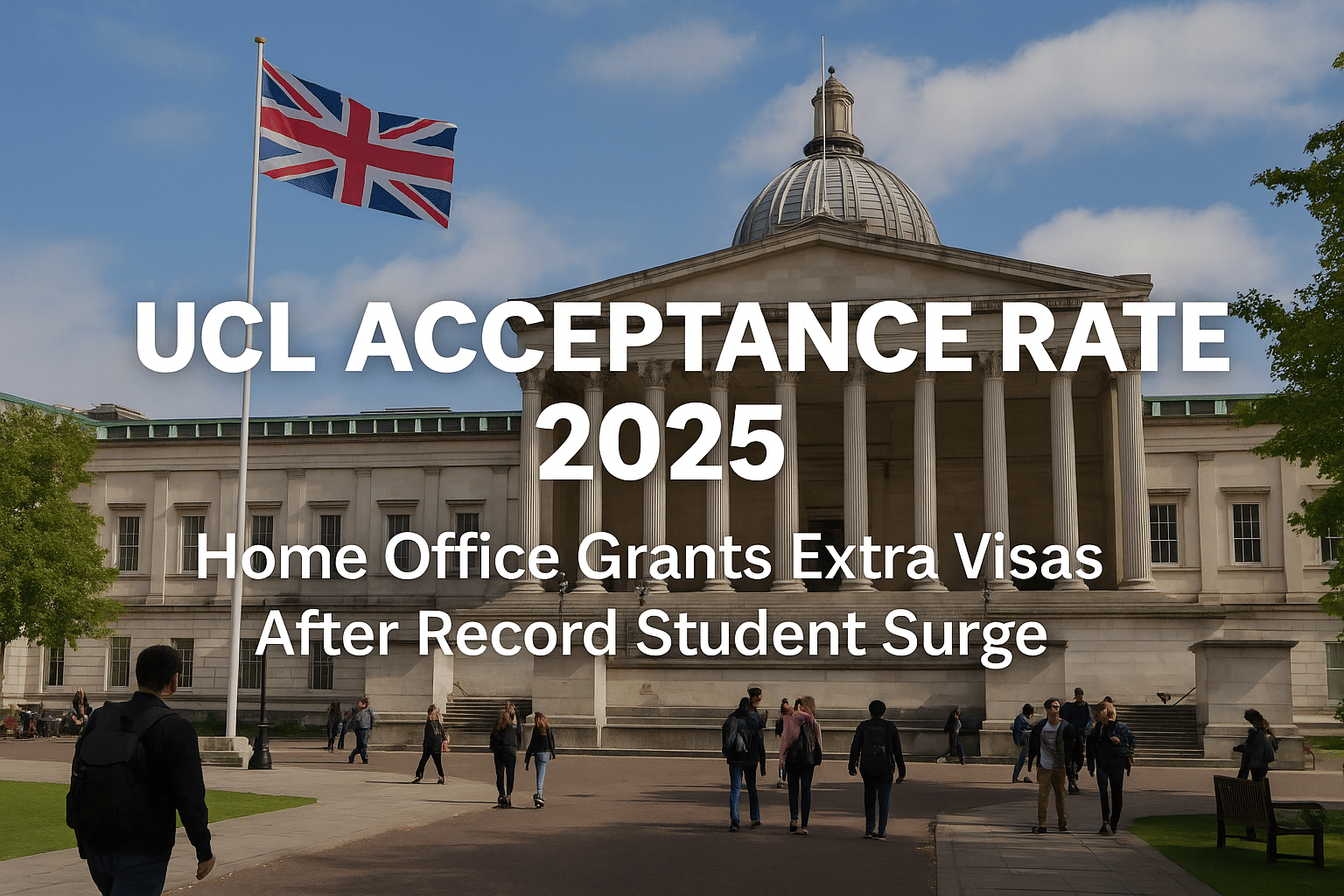October 7, 2025: Hundreds of international students, including a large number from India and China, will now be able to begin their studies at University College London (UCL) after the UK Home Office approved additional Confirmation of Acceptance for Studies (CAS) numbers. The move follows a surge in global applications that led UCL to exceed its visa allocation—leaving many students unable to apply for visas and uncertain about their academic future. This pushed UCL’s acceptance rate for 2025 to one of its lowest levels in recent years, creating delays and confusion for admitted students. Check Out
Background: A Surge Beyond Capacity
University College London, one of the UK’s most prestigious universities, witnessed an “extraordinary surge in demand” for postgraduate and taught programmes this year. The increase pushed the university beyond its permitted CAS limit, forcing hundreds of offer-holders to defer their studies or face cancellation of travel plans and prepaid accommodation.
After urgent negotiations between the Home Office and UCL, the government approved additional CAS issuances, allowing affected students to obtain visas and join classes for the Autumn intake in UK.
“We wholeheartedly apologise to all those who were impacted by the uncertainty. We thank the Home Office for acting swiftly to help us issue additional CAS numbers,”
said a UCL spokesperson.
To mitigate student losses, UCL also offered £1,000 compensation to those who used the UKVI super-priority visa processing service.
UCL Admissions 2025: Key Statistics
| Metric | Detail (2025) |
|---|---|
| Applications received | ~80,000+ (UG + PG combined) |
| UCL acceptance rate | 25–30% overall (approx. 18% PG international) |
| Top source countries | India, China, USA, Nigeria |
| CAS limit exceeded | Yes – additional allocation granted by Home Office |
| Student compensation | £1,000 for affected international applicants |
| Arrival deadline | October 10, 2025 (for postgraduate taught courses) |
Also Read
UCL Acceptance Rate: Trends and StatisticsFinancial Relief and Student Impact
To ease the burden, UCL offered a £1,000 reimbursement to students who expedited their UK visa processing. The decision came after several international students voiced distress over last-minute deferrals and non-refundable housing deposits in London.
Around 200 Chinese students and several Indian applicants were directly affected. All students enrolled in taught postgraduate courses must arrive by October 10 to retain their admission.
How This Affects Indian Students?
Indian students were among the most affected by this year’s visa bottleneck. With UCL’s postgraduate acceptance rate tightening and visa delays compounding uncertainty, many students had been forced to consider deferral or alternative universities in the UK.
Education consultants note that UCL’s popularity among Indian students has grown sharply due to its strong global rankings (currently #9 in QS World University Rankings 2025) and competitive placements in AI, Data Science, Public Policy, and Business Analytics.
Also Read
Top Programs offered by UCLWhat Led to the Crisis?
Under the UK’s visa regulations, every international student requires a CAS number, a unique electronic document confirming university admission before a visa can be issued. UCL’s over-recruitment—driven by record global demand—meant it exceeded its CAS quota.
When the issue surfaced, students were initially advised to defer to 2026, triggering backlash on social media and raising concerns about the UK’s reliability as a study destination.
UCL Acceptance Rate 2025: What the Surge Means
In 2025, UCL’s overall acceptance rate fell to around 25–30%, reflecting a steep rise in global demand for postgraduate and STEM programmes.
The university received over 80,000 applications this year, with Indian and Chinese students accounting for nearly half of all international submissions.
Experts suggest that UCL’s growing global reputation, combined with the UK’s post-study work opportunities, has made it one of the most competitive destinations for master’s degrees. However, this surge also led to administrative challenges — including the exceeding of UCL’s CAS allocation, which temporarily stranded hundreds of students awaiting visas.

Policy Lessons: Balancing Growth and Capacity
The UCL visa issue reflects a wider challenge facing UK universities balancing record international recruitment with visa quotas and compliance requirements. The Home Office’s flexibility in granting additional visas highlights the importance of coordination between universities and the government in managing international recruitment.
Education experts warn that frequent administrative hiccups could harm the UK’s global standing — particularly when countries like Germany, Ireland, and the Netherlands are streamlining visa pathways for foreign students.
Despite this, the UK remains a top choice for Indian students, with over 142,000 study visas issued to Indians in 2024, the highest among all nationalities.
Also Read
Broader Context: Visa Rules and Global Competition
The UK remains a top destination for international students, but growing competition is evident:
| Country | Key Attraction | Current Policy Trend |
|---|---|---|
| UK | 2-year post-study visa (reduced to 18 months from May 2025), globally recognised degrees | Tightened CAS quotas and higher visa scrutiny |
| Germany | Free or low-cost education, long-term residence routes | Actively expanding English-taught master’s |
| Ireland | Post-study work rights and tech sector integration | Simplified student permit processing |
| Netherlands | Fast-track visa system | English-language courses expanding yearly |
Education agents note that 60% of international students now reconsider destinations if visa or post-study work rules change mid-cycle—signaling the fragility of the UK’s appeal if administrative confidence dips.
What Happens Next for UCL Students
UCL has begun contacting all affected students individually with updated CAS documents and support information. The university has pledged to review its enrolment forecasting and CAS allocation model to prevent similar crises in future admission cycles.
“Our priority is ensuring that every student who chose UCL can start without further delay,” the spokesperson said.
This development underscores both the resilience of the UK higher education system and the urgency for better coordination between universities and government agencies as international demand surges again for 2026. Education analysts expect the UCL acceptance rate 2026 to remain low due to sustained global interest and limited capacity expansion.














Comments